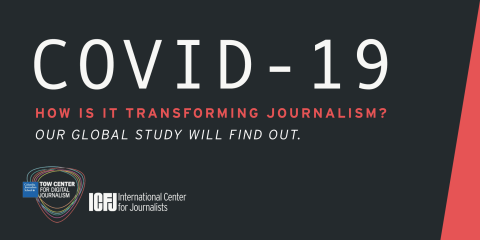
The International Center for Journalists (ICFJ) and Columbia University’s Tow Center for Digital Journalism are launching a joint study on the implications of the COVID-19 pandemic for journalism. This collaborative global research project aims to map the impact of the crisis on journalism and how journalists are responding to it.
“Along with the human toll of COVID-19, there is also a deadly blow to a growing number of news outlets,” said Julie Posetti, (Ph.D.) ICFJ’s Global Director of Research. “If journalism is to survive the pandemic, we will need quality research to help inform the recovery. This study aims to do just that.”
The "Journalism and the Pandemic" study kicks off with an international survey of reporters and news organizations to assess how the pandemic is transforming the daily business of newsgathering and publishing. It comes at a time when journalism’s role in informing the public and holding governments to account has never been more critical. At the same time, disinformation, safety risks and press freedom threats are mounting.
Posetti and Tow Center Founding Director and Professor Emily Bell will lead the longitudinal study, examining effects of the crisis on journalism over time. Specifically, the research team is examining how COVID-19 is:
- Transforming journalism practice and the business model,
- Propelling disinformation and triggering new ways to combat it,
- Increasing journalism safety risks and demanding urgent responses to them,
- Creating new global media freedom threats, intensifying existing threats, and triggering the need to insulate against them.
The researchers are asking journalists, editors and other news producers from around the world to support this research by participating in the survey. To this end, they will partner with ICFJ’s newly launched Global Health Crisis Reporting Forum, the International Journalists’ Network (IJNet), and the extensive networks of Columbia Journalism School and the Tow Center.
“Newsrooms worldwide are under intense financial, physical and psychological pressure during this pandemic,” Bell said. “By partnering with our colleagues at ICFJ to understand both the short and long-term impact of COVID-19 on journalism we can provide a basis of knowledge for encouraging much needed support in the field.”
For ICFJ, this research is part of a broader initiative to help journalists covering COVID-19, arguably one of the most important and complex stories of our time. The Global Health Crisis Reporting Forum, an initiative with ICFJ’s International Journalists’ Network (IJNet), connects reporters worldwide with health professionals, resources and each other. It also builds on ICFJ’s burgeoning research program, which includes studies on journalism and disinformation, online violence against journalists (commissioned by the United Nations), how newsrooms are adapting to the digital age, and more. In turn, this research supports the development of journalism through global knowledge sharing, and ICFJ’s evidence-based programs that support journalists internationally.
ICFJ empowers an unparalleled global network of journalists to produce news reports that lead to better governments, stronger economies, more vibrant societies and healthier lives. Since 1985, ICFJ has worked with more than 140,000 journalists from 180 countries. Its International Journalists’ Network (IJNet) reaches more than 150,000 media professionals each month in seven languages.
About the Tow Center for Digital Journalism
The Tow Center for Digital Journalism, established in 2010, provides journalists with the skills and knowledge to lead the future of digital journalism and serves as a research and development center for the profession as a whole. It operates as an institute within Columbia University’s Graduate School of Journalism.